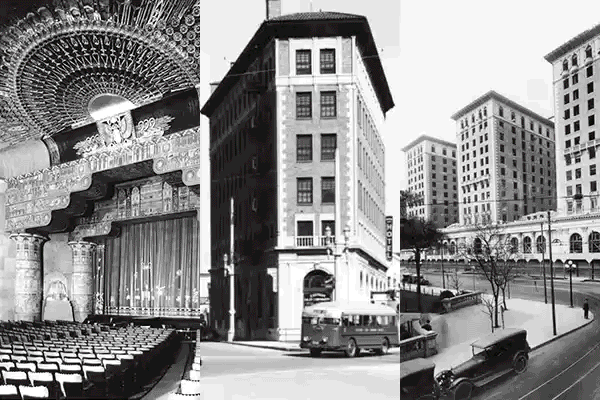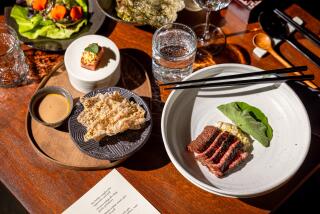TRAVELING IN STYLE : HOSPITALITY OF THE HEART : A nolstagic look at post-World War II touring, when the going--and the staying--was different
- Share via
I have always refused to succumb to the lure of nostalgia--except when it comes to travel. I was fortunate to have traveled extensively in the days when travel was glamorous, romantic, leisurely and civilized--in the days when adventure did not mean surviving terrorism or overcrowded skies.
Trains (the only civilized method of land locomotion) then still catered to every creature comfort, from smooth linen bed sheets to fresh-caught Rocky Mountain trout and the very best of aged Kansas City beef. They had evocative names such as the 20th Century Limited and the Super Chief. In Europe, the names were even more romantic: The boat trains to Southampton or Le Havre were known, depending on the language, as the Golden Arrow or the Fleche d’Or. And everyone knows, thanks to Agatha Christie, that you got from Paris to Venice on the Orient Express. I always used to re-read the appropriate Christie classic when I made those trips. Back then, ships (the only way to cross an ocean) provided pleasure and luxury. The French liners--the Ile de France, the Liberte, the France and the tiny De Grasse--were the best of all possible travel worlds. The point, in those days, was not to get there quickly but to get there in comfort and style.
My fondest travel memories, however, are not necessarily the most glamorous ones. They are what I would call the most human and heartwarming of times. I am thinking of the early postwar years in Europe when a feast seemed most especially festive because there was so little food to be had. And preparing those meals required a great sense of imagination as well as great generosity. In those years, one felt less like a tourist and more like an unexpected but welcome guest in a large household.
I made my first trans-Atlantic voyage in the late autumn of 1947 on the Cunard liner Mauretania. The ship had been newly refitted after wartime convoy duty, but the weather was cold and stormy, and it was a rough 10-day crossing. The staterooms had regained their old teak-and-brass glory, but the dining room fare was definitely non-luxe: potatoes,potatoes and more potatoes, with sole, turbot or cutlets on the side. The service at the captain’s table, however, and throughout the ship was impeccably British. The trip prepared us, in more ways than one, for our future English stay and postwar austerity.
London’s winter of 1947 was one of the coldest on record, and there was little coal for heat. Bomb craters were everywhere, and coupons were still part of the currency--eight of them being the price of a handkerchief, for example. But the coldness of the weather was in direct contrast to the cheery warmth of the people. Certain hotels could be relied upon for special treats. The Hotel Piccadilly, for instance, rarely had meat, but there were wonderful steamed kippers and plenty of ersatz, but hearty, sausages made of bread and parsley. And the beds were deep and downy. The elegant Savoy, also mostly meatless, could be counted on for Scotch salmon and the occasional haggis. Apples were as rare as caviar, but fish and chips were plentiful.
Because food was so scarce and restaurant fare so meager, we tended to spend a great deal of time with our wonderful English friends--mostly journalists and actors--touring the pubs. We forgot the rigors of shortage amid the irresistible conviviality of public-house life and its offerings. I fell in love with Pimm’s Cups, and--somewhere in Soho, in a pub we visited with Dylan Thomas--my husband, Lennie Hayton, discovered his first Pernod dripper (a magnificent glass contraption). Lennie soon developed a taste for Pernod that made him forget our meatless diet. He also managed a trip to bombed-out Coventry to purchase a brand-new postwar Jaguar convertible touring car with elegant prewar lines--the best of British-made.
Although the freezing temperatures complemented the barrenness of London larders, its citizens could be counted on for their generosity. And London audiences were the most hospitable in the world, using precious coupons to deliver stage-door gifts. Eggs were discouragingly scarce, and Lennie was an eggs-for-breakfast junkie. Through the extraordinary kindness of James Mason’s mother, Lennie received fresh country eggs, delivered in a basket, to feed his habit. Mrs. Mason’s gesture was typical of the wonderful largess of British spirit--the kind that saw the British through the war.
Paris, that same winter--after my roughest channel crossing ever, one punctuated by a hilarious trip from Calais to Paris in a World War I-vintage taxi--was a different story. Despite, or because of, the years of German occupation, there was a sense of abundance, as well as a thriving black market. There was not a great deal of meat, but chicken and eggs and every possible variety of shellfish were plentiful.
We stayed at the Hotel Raphael, which represented the height of luxury, from crystal chandeliers and silk damask walls to curving marble staircases. The food was glorious--real bacon, Parma ham, great bread and wine (as well as all the eggs that Lennie could want). And there was beautiful Paris and wonderful new friends to make--such as Yves Montand, Simone Signoret and the unforgettable Edith Piaf.
However, to remind us that even Paris was still in a transition period between the end of the war and real peace, we had arrived in the midst of a series of general strikes. One day there would be no electricity, another day no heat, another day no postal service. (On our first trip to the Louvre we were denied admission with the words, “Sorry, madame, we have decided to go on strike.”) But one of our American friends, who worked for an international refugee organization, reminded us of wartime ingenuity. At a small dinner party in his apartment, during an electricity strike, we managed to keep the chocolate mousse chilled in the bidet.
The state of Israel, shortly after gaining independence, was another example of a country with a generosity of spirit that more than made up for the emptiness of its larders. In the spring of 1950, we traveled by ship from Naples to Haifa. The Mediterranean crossing was glorious, calm and sun-drenched. And the Artsa was a tiny, happy ship, full of exuberant refugees.
We traveled by car to Jerusalem, and all along the road were burned-out tanks and signs of recent warfare. Food shortages were acute. The usual Israeli fare was macaroni kugel (a heavy pasta dish).
The man of the hour was the bartender of the King David Hotel, who managed (through astute underground trading land) to keep reserves of whiskey and gin.
My most memorable Israeli feast was provided by none other than Golda Meir. It was typical of the sense of generosity of mind and imagination over matter that I am trying to describe. Thanks to my Los Angeles Hadassah connections, Mrs. Meir gave a small dinner in our honor, preparing the chopped liver herself. Only, she confessed to us later, there was no liver in the “chopped liver”--only chicken fat and yeast. It was delicious nonetheless.
I am nostalgic above all, I suppose, for potluck and hospitality of the heart in a time when the world was still recovering from slaughter and upheaval; a time when the light of the human spirit seemed brighter than ever because the past was finally over and the future was about to begin.
More to Read
Sign up for The Wild
We’ll help you find the best places to hike, bike and run, as well as the perfect silent spots for meditation and yoga.
You may occasionally receive promotional content from the Los Angeles Times.






